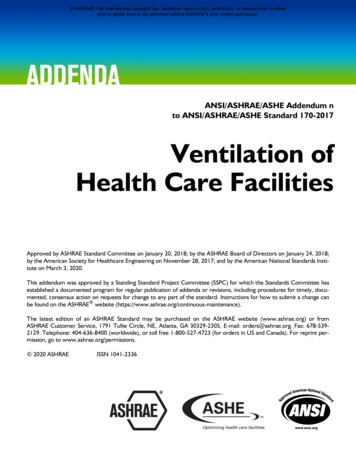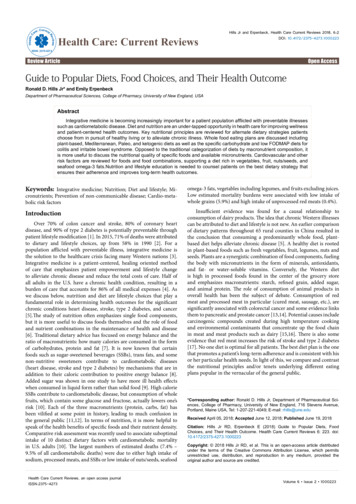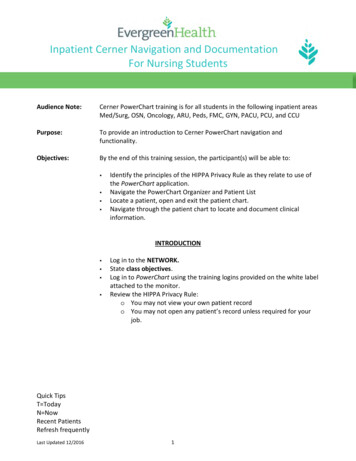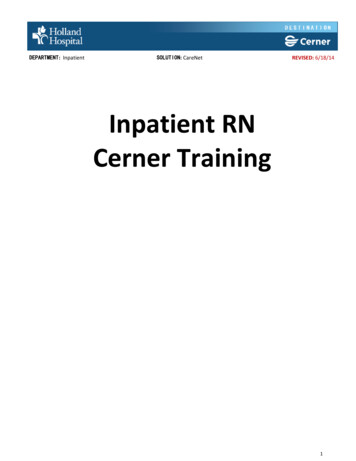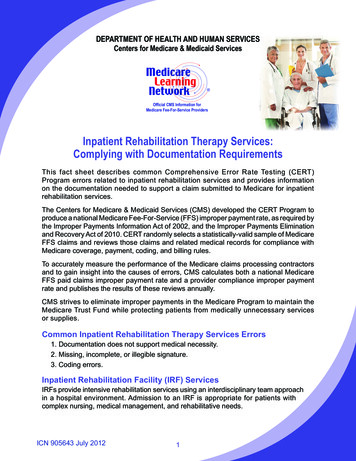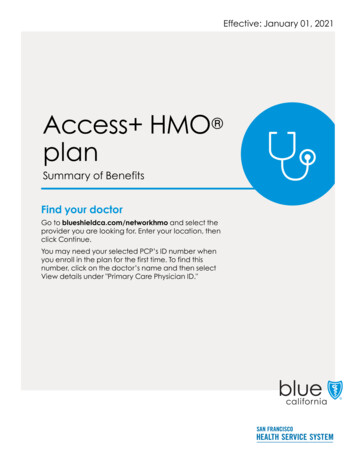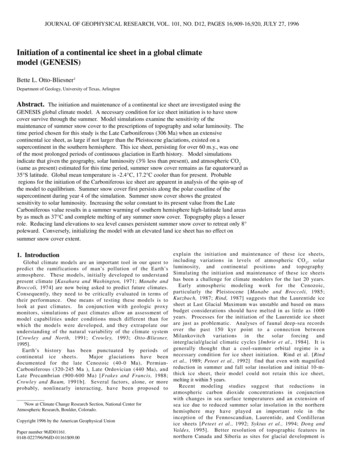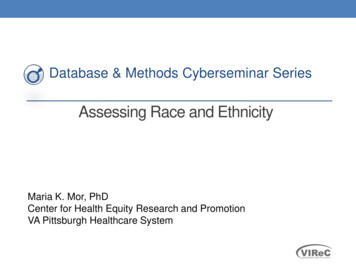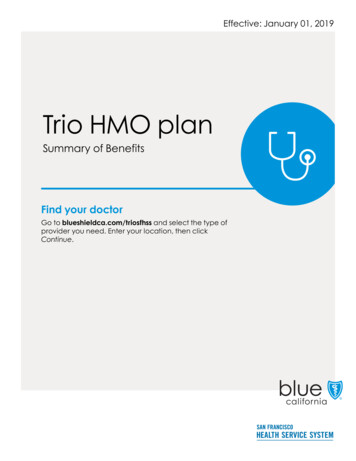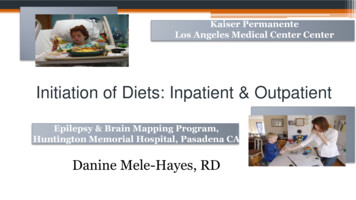
Transcription
Kaiser PermanenteLos Angeles Medical Center CenterInitiation of Diets: Inpatient & OutpatientEpilepsy & Brain Mapping Program,Huntington Memorial Hospital, Pasadena CADanine Mele-Hayes, RD
History of KD initiationEarly Initiation(Wilder1921)Fasting Protocol(Livingston 1954; 1972; Freeman et al 1996)Gradual Non-fasting Protocol(Bergqvist et al 2005)
Early Fasting Protocol(Livingston 1954; 1972; Freeman et al 1996).24-48 hour FastFluid Restriction1/3 calories FirstDay2/3 caloriesSecond Day4:1 RatioFull CaloriesThree Day
Pre-diet Assessment Screen for inborn errors of metabolismScreen for diet contraindicationsKeto Blood WorkDiet History/Diet AnalysisReduce carbohydrates from medications andsupplements
Non-Fasting Initiation Protocols(Wirrell EC et al. J Child Neuro 2002 Mar 17(3):179-82.)3-5 Day AdmissionNo Fluid RestrictionEggnog or KetoShakeGoal Ratio andCaloriesReachedCalculatedMealsParentEducation
Initiation Orders Pre-diet labs (If not done prior) Vital signs q shift (during waking hours) Weight & Height upon admission; daily weights Urine ketones and Urine Specific gravity q void Accuchecks q 2 hours if infants, after 24 hrs q 4 hrsif no hypoglycemia Accuchecks q 4 hours if 1 years old Labs: Day 2: Electrolytes & Fasting Blood Sugar Day 3: Electrolytes, Fasting Blood Sugar, Fasting Lipid Panel, BHBSeizure precautions
KD PrescriptionDay 1 Ketogenic Shake @2.0:1 ratio offered six times perday with goal calories and fluidsDay 2 3 meals & bedtime snack @ 3.0:1 ratio with goalcalories and fluidsDay 3 Arbitrary goal ratio is reached. Discharge after lunchif normoglycemia and diet tolerance established andurinary ketones are positive
Monitoring KD InitiationHydrationBlood KetonesBetahydroxybutyrate4-10 mmol/LUrine SpecificGravity1.010-1.020Urine KetonesUrine Ketones:80-160 mg/dlBlood GlucoseAccuchecks q 24 hours50-80 mg/dl(non-fasting)Acid-base balanceGoalsElectrolytesHCO3 18 mEq/L
Treating Diet Intolerance: Nausea and EmesisCorrect HypoglycemiaCorrect acidosisCorrect excessive ketosisGive six (6) small feedingsSeparate medication and meal time
Prevention of DehydrationAdhere to fluidscheduleMaintain UrineSpecific Gravity1.010 -1.020If dehydration occurs, USG 1.030 Give IV bolus of .9NS if needed
Monitor Blood Ketone LevelsFreeman JM. J Child Neuro 2000;15 (12):787-90Betahydroxbutyrate(BHB) Levels 4-10 mmol/L Monitor during initiation and outpatient clinicUseful in assessing dietary compliance/tolerancefor fine tuning the diet Diet intolerance, acidosis, dehydration may occur withlevels 6 mmol/L.Treatment for excessive ketosis Increase fluids and/or give 15 ml of apple juice. May needto lower ratio.
Treatment of AcidosisPhosphorousBakingSodaBufferAcidosisCytra KPotassiumChlorideGive 100% Maintenance Fluids plus up to 20% more
Treatment of AcidosisGive 100% Maintenance Fluids plus up to 20% moreBaking Soda0.5-2.0 mEq/kg(54.7 mEqBicarbonate/tsp)Mix with at least 120 mlof water (NOTFORMULA) give 2-3times per day.Phosphorous:Dosage based onageGive 3-4 times perday. (longer actingbuffer)Bicarbonate:About 50% DRIPotassium: 30% DRIMorton’s lite SaltMay be sprinkled onfood or mixed withformula.
Outpatient Initiation ProtocolDuration 3-4 weeksStart at 0.5:1 or1.0:1 RatioStart withGoalCaloriesNo FluidRestrictionAdvance ratioevery weekLabs obtainedafter one weekof 2:1 RatioRatio notadvance ifseizure controlis achieved.
Outpatient KD TrainingFood Preparation(Weighing ckdaysMonitoringKetones/hypoglycemiaFluids
Outpatient Initiation: (Low and Slow method)Week 1Week 2Week 3Week 41.0: 1 Ratio2.0:1 Ratio3.0:1 RatioCalculatedmeal plansat goalcaloriesand fluidsBloodWork atthe end ofweek 2AdditionalSupplements asneededRatioadvancedbased onseizurecontroland diettoleranceStartVitamins/MineralsChildren 2 years old
Initiation Diet: Infant/ Toddlers & Enteral Fed PatientsWeek 1Week 2Week 3Week 40.5: 1 Ratio1.0:1 Ratio1.5:1 Ratio2.0:1 RatioGoal Calories& FluidsGoalCalories/FluidsKeto Formula&Baby/EnteralFormulaKeto Formula &CHO/ProteinSourceStartVitamins/MineralsBlood Workat the end ofthis week
Outpatient MonitoringDaily Urine Ketones 1-2 times per day for one month Bowel Movement Seizure LogWeek Blood Work after one week of 2:1 Ratio Phone or Office Visit RD and/or Nurse Weekly weightMonth Office follow up in one-month then every 3 mths Blood Work after first month & every 3 mths thereafter forfirst year
Advantages for Dietitian and PatientDietitianPatient/FamilyMore than one initiation per monthLonger diet adjustmentBetter time managementMore variety of food optionsDevelop more palatable mealsHome environmentKD education prior to initiationParents work schedule not altered
Case Study10 year old female with medical history ofEpilepsy ( 20 seizure per day), CerebralPalsy, Gastrostomy Tube
Baseline Weight and Height Weight 46 lbs (20.865 kg) Percentile: 10-50% Weight for Age Based on CP Group 5 for girls 2-20 years old Height 114.3 cm (45 in) Percentile: 10-50% Height for Age Based on CP Group for girls 2-20 years old
Diet History Formula: Boost Kids Essential 1.5 Regimen: Continues feeding full strength at 60 mlper hour for 15.5 hours per day Total Calories: 950 kcals per day Total fluids per day 1008 ml of free water Supplements: 50 mg Vitamin B6 per day D-Vi-Sol 1 ml per day
Estimated Nutritional Needs 1080 calories per day ( 50 kcals/kg BW) 21-25 grams Protein per day (1.0-1.2 g Pro/kgBW) Recommended fluids: 1500 plus 20 (wt20)mL/day 1518 mL : Source; HolidaySegar Method
Initiation of KD (STEP 1) 240 ml of Boost Kids Essentials474 ml of KetoCal Liquid 4:1 Ratio240 ml of waterRun at 60 ml per hour for 18 hoursFlush 120 ml (4 oz) of water after formula finishes20-30 ml of water for medicationContinue for 1 week if toleratedProvide 1052 kcals, 1400 ml Fluids, 1:1 Ratio 81.98 g FAT, 29.74 g Pro, 48.67 CHO
Initiation of KD (STEP 2) 160 ml of Boost Essential for Kids 1.5570 ml of KetoCal 4:1 Ratio LQ360 ml of WaterRun pump at 60 ml for 18 hoursFlush 120 ml of water after formula finishes20-30 ml of water for medicationContinue for 1 week if tolerated1080 kcals, 1400 ml fluids 1.5:1 Ratio, 92.37 g FAT, 27.8 gPro, 34.37 g CHO
Supplements started on (STEP 2) 1/2 tablet of Centrum Multivitamin per day. 1 tablet of Nature Made 600mg Calcium and 400IU Vitamin D 50 mg Vitamin B6 1 tablet per day 2 ml of Levocarnitine three times per day. 1/4 teaspoon of Morton's Lite Salt per day ( mixinto the formula)
Initiation of KD (STEP3) 100ml of Boost Essential for Kids 1.5630 ml of KetoCal 4:1 Ratio LQ360 ml of WaterRun pump at 60 ml for 18 hoursFlush 120 ml of water after formula finishes20-30 ml of water for medicationContinue for 1 week if tolerated1078 kcals, 1400 ml fluids 2.0:1 Ratio, 98.12 g FAT, 25.8 g Pro, 23.14 g CHO
Assessment & Labs one week after 2:1 Ratio KD follow up labs unremarkable BHB 3.08 mmol/L 50% improvement in seizures less than 10 yearsper day Lipid Panel WNL Liver Function WNL
Fine-tuning KD (STEP 4) 76 ml Prune Juice Sunsweet Light707 ml KetoCal 4:1 LQ300 ml WaterRun pump at 60 ml for 18 hoursFlush 120 ml of water after formula finishes20-30 ml of water for medicationContinue for 1 week if tolerated1078 kcals, 1400 ml fluids 3.0:1 Ratio, 104.71 g FAT, 22.16 g Pro, 12.52 g CHO
ConclusionInpatient InitiationOutpatient InitiationMost Common MethodEvolving New Method3-5 days admission3-4 weeks initiationRapid transition to ketosisSlower transition to ketosisUse an arbitrary goal ratio which maybe too highSeizure control can be achievedwith lowest ratioDiet adjustments every 18-24 hoursDiet adjustments 7-14 daysLimited food available in the hospitalVariety of foods available at homeAcute metabolic fluctuations mayoccurLess occurrence and severity ofmetabolic fluctuations
Mar 04, 2017 · 24-48 hour Fast Fluid Restriction 1/3 calories First Day 2/3 calories Second Day 4:1 Ratio Full Calories . Screen for inborn errors of metabolism Screen for diet contraindications Keto Blood Work
